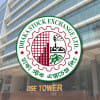SME stocks soar though giant firms struggle

Shares of small capital-based companies surged abnormally on the Dhaka Stock Exchange (DSE) in the past month whereas the benchmark index of the premier bourse of Bangladesh, as well as blue-chip securities, has been in a bearish mood.
It is understandable why the wider market is falling: economic uncertainty is deepening owing to the Russia-Ukraine war, supply chain woes, runaway inflation, and re-surging coronavirus infections. And there is no end to the crisis in sight.
But the abnormal rise of SME stocks is raising questions and analysts are pointing their fingers at speculations and rumours.
The DSEX, the key index of the DSE, dropped 1.83 per cent, or 119 points, in the last one month. The DS-30, the blue-chip index representing reputed companies, plunged 2.54 per cent, or 60 points.
However, the SME Index soared 51 per cent, or 696 points. In fact, the index, which consists of 12 little-known companies, rocketed 350 per cent in the last one year.
The DSE-SME, the small-cap board, was rolled out on April 30, 2019, in order to allow small and medium enterprises (SMEs) with a paid-up capital between Tk 5 crore and Tk 30 crore to raise funds from the stock market.
The move was applauded by analysts since most SMEs in Bangladesh don't have adequate access to finance although there are 78 lakh such enterprises in the country and they collectively contribute about 25 per cent to the gross domestic product.
Since then, shares of Bengal Biscuits, Star Adhesives, Nialco Alloys, Wonderland Toys, BD Paints, Apex Weaving and Finishing Mills, Krishibid Seed, Mostafa Metal Industries, Krishibid Feed, Mamun Agro Products, Oryza Agro Industries, Master feed Agrotec, and Himadri Ltd have been trading on the board.
Taking into account the risks usually faced by SMEs, the Bangladesh Securities and Exchange Commission (BSEC) actually had planned not to allow general investors to trade on the new board without prior permission. Individual investors with a stock market investment of at least Tk 50 lakh had to take approval to buy and sell SME stocks.
But the prices of SME shares had remained low due to the thin presence of general investors, and most of the shares were in the hand of institutional investors. This is opposite to the share ownership structure of the DSE where general investors account for 80 per cent of the total turnover, while institutional investors represent the rest 20 per cent.
This led institutional investors -- asset management companies, brokerage houses, merchant banks, mutual funds, pensions, and insurance companies -- to urge the BSEC to relax rules to pave the way for general investors to take part in the buying and selling of the shares.
Subsequently, the regulator issued a circular in February this year, saying if an investor has an investment of Tk 20 lakh in the market, they will not require any permission to trade on the SME board.
The changes gave the institutional investors the opportunity to sell the stocks as many general investors rushed to them by paying heed to rumours and speculations.
Since the listed SMEs have offloaded a small number of securities, speculations often do the rounds that their price would rise further, wooing gullible general investors, said a top official of a stock brokerage firm.
For example, Himadri Ltd, which runs six potato cold storage units in the northern part of Bangladesh and is a subsidiary of Ejab Group, has offloaded 11,775 shares, the lowest among the listed SMEs. BD Paints, a paint manufacturer, floated the highest number of shares, at about 4.24 crore, data from the DSE website showed.
"The trading pattern on the SME Board looks unusual because a daily rise of 8 per cent to 10 per cent is not justifiable," said the stockbroker.
Of the 12 SMEs listed, six companies rose more than 9 per cent on July 7, the last trading day before the Eid holidays. The companies are Bengal Biscuits, BD Paints, Mostafa Metal Industries, Master Feed Agrotec, Nialco Alloys and Mamun Agro Products, DSE data showed.
What is even more startling is that the share of most SMEs is trading higher than that of some of the blue-chip companies, which are well-known for steady growth, strong fundamentals, and sound business practices.
For example, Bengal Biscuits, BD Paints, Nialco Alloys, Wonderland Toys, and Star Adhesive all are trading above Tk 50 whereas companies such as Brac Bank, City Bank, Eastern Bank, IFIC Bank, Islami Bank Bangladesh, non-banking financial institutions IDLC and LankaBangla, mobile phone operator Robi, electricity producer Summit Power, and gas utility company Titas Gas are trading below Tk 50.
Mohammad Rezaul Karim, a spokesperson of the BSEC, says the regulator has relaxed the conditions following requests from the associations of market intermediaries.
Since the number of listed SMEs and the number of their shares available for trade is low, their prices have gone up, he said.
"If more SMEs go public, the demand and supply gap will narrow."
Karim could not say immediately whether the SME shares are overvalued and added that such conclusion can be made after they announce dividends.
"Our surveillance team is closely monitoring to find out whether anyone is doing anything unlawfully," he said.

 For all latest news, follow The Daily Star's Google News channel.
For all latest news, follow The Daily Star's Google News channel. 








Comments